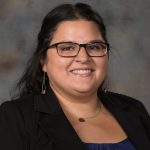Little Berks 2020
Speaker Bios
Virginia Espino (UCLA)
Edited bio via https://chavez.ucla.edu/person/virginia-espino/
 Virginia Espino is a lecturer in the Departments of Chicano/a and Central American Studies and Labor and Workplace Studies. She earned her PhD from Arizona State University writing about population control politics and reproductive injustice during the 1970s. Her research has been published in the Chicano Studies Journal, Aztlan and her investigation into the history of coercive sterilization at the Los Angeles-USC Medical Center provided the impetus for the documentary film, No Más Bebés, for which she is a Producer and Lead Historian. As a series leader for Latina and Latino History at UCLA’s Center for Oral History Research she developed oral history series that document the California Latina/o community and helped the Center build a valuable archive for scholars and the public at large.
Virginia Espino is a lecturer in the Departments of Chicano/a and Central American Studies and Labor and Workplace Studies. She earned her PhD from Arizona State University writing about population control politics and reproductive injustice during the 1970s. Her research has been published in the Chicano Studies Journal, Aztlan and her investigation into the history of coercive sterilization at the Los Angeles-USC Medical Center provided the impetus for the documentary film, No Más Bebés, for which she is a Producer and Lead Historian. As a series leader for Latina and Latino History at UCLA’s Center for Oral History Research she developed oral history series that document the California Latina/o community and helped the Center build a valuable archive for scholars and the public at large.
Margaret Huetl (Univ. of NE-Lincoln)
Bio via https://history.unl.edu/margaret-huettl
 Margaret Huettl, Assistant Professor in History and Ethnic Studies, earned her PhD in History from the University of Nevada, Las Vegas (2016), her M.A. in Native American history from the University of Oklahoma (2010), and her B.A. from the University of Rochester (2008). She is a scholar of Native American history and North American Wests, and her research examines Indigenous sovereignty and settler colonialism in a transnational context.
Margaret Huettl, Assistant Professor in History and Ethnic Studies, earned her PhD in History from the University of Nevada, Las Vegas (2016), her M.A. in Native American history from the University of Oklahoma (2010), and her B.A. from the University of Rochester (2008). She is a scholar of Native American history and North American Wests, and her research examines Indigenous sovereignty and settler colonialism in a transnational context.
Her current project, “Ojibwe Peoplehood in the North American West, 1854-1954,” explores Ojibwe or Anishinaabe sovereignty in the United States and Canada during the nineteenth and twentieth centuries, centering her research on Anishinaabe ways of knowing. Her research and teaching interests focus on Indigenous histories in North America, with a special interest in ethnohistorical methods and public history.
Margaret Jacobs (Univ. of NE-Lincoln)
Edited bio via https://history.unl.edu/margaret-jacobs
Margaret Jacobs is the Chancellor’s Professor of History at the University of Nebraska-Lincoln. She studies the history of the American West in comparison with Australia and Canada. Margaret focuses on women and gender as well as children and family. For the last twenty years she has studied Indigenous child removal. Many of her books and articles concern government policies from 1880-1940 that demanded that Indigenous children be separated from their families and sent to distant boarding schools and other institutions.
Her more recent scholarship examines how government authorities in the U.S., Australia, and Canada continued to remove Indigenous children after World War II through foster care and adoptive placements in non-Indigenous families. This work also focuses on how Indigenous women mobilized transnationally to reclaim the care of their children. Her current projects focus on both examining and promoting reconciliation between Indigenous and non-Indigenous peoples.
Farina King (Northeastern State)
Shortened Bio via https://farinaking.com/biography/
 Farina King is “Bilagáanaa” (Euro-American), born for “Kinyaa’áanii” (the Towering House Clan) of the Diné (Navajo). Farina is an Assistant Professor of History at Northeastern State University, Tahlequah, Oklahoma. She is also an affiliate of the Cherokee and Indigenous Studies Department and the Director of the NSU Center for Indigenous Community Engagement. Her main area of research is colonial and post-colonial Indigenous Studies, primarily Indigenous experiences of colonial and distant education.
Farina King is “Bilagáanaa” (Euro-American), born for “Kinyaa’áanii” (the Towering House Clan) of the Diné (Navajo). Farina is an Assistant Professor of History at Northeastern State University, Tahlequah, Oklahoma. She is also an affiliate of the Cherokee and Indigenous Studies Department and the Director of the NSU Center for Indigenous Community Engagement. Her main area of research is colonial and post-colonial Indigenous Studies, primarily Indigenous experiences of colonial and distant education.
Farina has written and presented about Indigenous Mormon experiences in the twentieth century, drawing from some interviews that she conducted for the Latter-day Saint Native American Oral History Project at the Charles Redd Center for Western Studies. Her research traces the changes in Navajo educational experiences through the twentieth century, using a hybrid approach of the Diné Four Directions. Her greatest inspirations are her family, especially her children. Other than learning different languages and having fun with her family, Farina loves to sing, dance, and travel.
Deirdre Cooper Owens
Shortened bio via https://www.deirdrecooperowens.com/bio
 Deirdre Cooper Owens is The Charles and Linda Wilson Professor in the History of Medicine and Director of the Humanities in Medicine program. She is also an Organization of American Historians’ (OAH) Distinguished Lecturer. A popular public speaker, she has published essays, book chapters, and blog pieces on a number of issues that concern African American experiences. Her first book, Medical Bondage: Race, Gender and the Origins of American Gynecology (UGA Press, 2017) won the 2018 Darlene Clark Hine Book Award from the OAH as the best book written in African American women’s and gender history.
Deirdre Cooper Owens is The Charles and Linda Wilson Professor in the History of Medicine and Director of the Humanities in Medicine program. She is also an Organization of American Historians’ (OAH) Distinguished Lecturer. A popular public speaker, she has published essays, book chapters, and blog pieces on a number of issues that concern African American experiences. Her first book, Medical Bondage: Race, Gender and the Origins of American Gynecology (UGA Press, 2017) won the 2018 Darlene Clark Hine Book Award from the OAH as the best book written in African American women’s and gender history.
Professor Cooper Owens is also the Director of the Program in African American History at the Library Company of Philadelphia, the country’s oldest cultural institution. Currently, she is working on a second book project that examines mental illness during the era of United States slavery and is also writing a popular biography of Harriet Tubman that examines her through the lens of disability. She primarily teaches classes on the history of medicine.
Einav Rabinovitch-Fox (Case Western Reserve)
Shortened bio via https://www.einavrabinovitchfox.com/
 Einav is a Visiting Assistant Professor in the Department of History at Case Western Reserve University in Cleveland, OH. She holds a PhD in History from New York University (2014) in 20th Century U.S history, with a particular focus on Women’s and Gender History. Her research examines the connections between material culture, politics, and modernity, particularly in the ways in which visual and consumer culture has shaped and reflected class, gender, and racial identities.
Einav is a Visiting Assistant Professor in the Department of History at Case Western Reserve University in Cleveland, OH. She holds a PhD in History from New York University (2014) in 20th Century U.S history, with a particular focus on Women’s and Gender History. Her research examines the connections between material culture, politics, and modernity, particularly in the ways in which visual and consumer culture has shaped and reflected class, gender, and racial identities.
She is also interested in the history of print culture and advertising, and their relationships with social and political movements. Her book manuscript, Dressed for Freedom: The Fashionable Politics of American Feminism (under contract with University of Illinois Press), explores women’s uses of fashion as a means of negotiating new freedoms and of expressing modern political and gender identities. Using fashion as lens, the book reveals how questions of beauty and appearance were an important part of feminist struggles and ideology during the twentieth century.
J. E. Smyth (University of Warwick UK)
Edited bio via https://jesmyth.co.uk/about/
 J.E. Smyth is an American film historian and critic. She is currently a Professor of History at the University of Warwick. Her main interests are women’s employment and representation in Hollywood, historical gangster films, Westerns, Twentieth Century-Fox Film Corp., and the history and practice of screenwriting and editing. Smyth has written or edited eight books about Hollywood, including a new edition of Jane Allen/Silvia Schulman’s Hollywood novel, I Lost My Girlish Laughter (Random House, 2019).
J.E. Smyth is an American film historian and critic. She is currently a Professor of History at the University of Warwick. Her main interests are women’s employment and representation in Hollywood, historical gangster films, Westerns, Twentieth Century-Fox Film Corp., and the history and practice of screenwriting and editing. Smyth has written or edited eight books about Hollywood, including a new edition of Jane Allen/Silvia Schulman’s Hollywood novel, I Lost My Girlish Laughter (Random House, 2019).
Her most recent monograph is Nobody’s Girl Friday (Oxford University Press, 2018), a history of the many high-powered women who worked in the Hollywood studio system (1924-1954). While all of Smyth’s work on Hollywood can be classed as “revisionist” (meaning: she gives studio-era filmmakers credit for the brains they had), Nobody’s Girl Friday reveals a film industry that supported the careers of many women in a range of creative and administrative work, from executives and producers to writers, editors, designers, actors, agents, critics, and director
Landon Storrs (University of Iowa)
Bio via https://clas.uiowa.edu/history/people/landon-storrs
 Landon Storrs specializes in twentieth-century U.S. social and political history, particularly in the history of women, social movements, and social policy. Her current research examines the work of the U.S. social scientist Caroline Ware on international programs for community development and for women’s empowerment, primarily in Latin America, during the post-1945 decades. Caroline Ware was one of the protagonists of Storrs’s 2012 book, The Second Red Scare and the Unmaking of the New Deal Left (Princeton University Press, 2012).
Landon Storrs specializes in twentieth-century U.S. social and political history, particularly in the history of women, social movements, and social policy. Her current research examines the work of the U.S. social scientist Caroline Ware on international programs for community development and for women’s empowerment, primarily in Latin America, during the post-1945 decades. Caroline Ware was one of the protagonists of Storrs’s 2012 book, The Second Red Scare and the Unmaking of the New Deal Left (Princeton University Press, 2012).
Using newly declassified government records, Second Red Scare showed that the federal employee loyalty program—created in the 1940s in response to fears that Communists were infiltrating the U.S. government—rigidly constrained policymaking in fields including public assistance, national health insurance, labor and consumer protection, civil rights, and international aid. The loyalty program not only destroyed or redirected the careers of many noncommunist officials, it prohibited discussion of social democratic policy ideas in government circles—narrowing the scope of American political discourse to this day. The book also documented the antifeminism of the Old Right, showing how conservatives exploited popular hostility to female government officials in order to discredit left-liberal policies.
Renee Tajima-Peña (UCLA)
Edited bio via https://asianam.ucla.edu/person/renee-tajima-pena/
 Renee Tajima-Peña is Professor of Asian American Studies, Director of the Center for EthnoCommunications and holder of the Alumni and Friends of Japanese American Ancestry Endowed Chair. She is an Academy Award-nominated documentary filmmaker whose credits are Who Killed Vincent Chin? My America…or Honk if You Love Buddha, Calavera Highway, Skate Manzanar, Labor Women, No Más Bebés and other films about themes of immigration, race, ethnicity, gender and social justice. Her films have screened at the Cannes Film Festival, New Directors/New Films, South By Southwest Film Festival, Sundance Film Festival, Toronto International Film Festival and the Whitney Biennial. Tajima-Peña is the series producer/showrunner of Asian Americans, an unprecedented 5-hour series on the Asian American experience that aired on PBS in May 2020. Tajima-Peña has been deeply involved in the Asian American independent film community as an activist, writer and filmmaker.
Renee Tajima-Peña is Professor of Asian American Studies, Director of the Center for EthnoCommunications and holder of the Alumni and Friends of Japanese American Ancestry Endowed Chair. She is an Academy Award-nominated documentary filmmaker whose credits are Who Killed Vincent Chin? My America…or Honk if You Love Buddha, Calavera Highway, Skate Manzanar, Labor Women, No Más Bebés and other films about themes of immigration, race, ethnicity, gender and social justice. Her films have screened at the Cannes Film Festival, New Directors/New Films, South By Southwest Film Festival, Sundance Film Festival, Toronto International Film Festival and the Whitney Biennial. Tajima-Peña is the series producer/showrunner of Asian Americans, an unprecedented 5-hour series on the Asian American experience that aired on PBS in May 2020. Tajima-Peña has been deeply involved in the Asian American independent film community as an activist, writer and filmmaker.
Emily Westkaemper (James Madison University)
Bio information via https://www.jmu.edu/history/people/all-people/westkaemper-emily.shtml
and http://www.ubcpress.ca/selling-womens-history
 Emily Westkaemper is an Associate Professor of History at James Madison University. Her research interests focus on gender and consumer culture, working women’s activism, popular memory, twentieth-century feminisms, and the history of advertising. Her first book, Selling Women’s History: Packaging Feminism in Twentieth-Century American Popular Culture, explores the ways in which twentieth-century popular culture taught Americans about the accomplishments of their foremothers, promoting an awareness of women’s wide-ranging capabilities. This feminist work challenged sexist assumptions about women’s subordinate roles.
Emily Westkaemper is an Associate Professor of History at James Madison University. Her research interests focus on gender and consumer culture, working women’s activism, popular memory, twentieth-century feminisms, and the history of advertising. Her first book, Selling Women’s History: Packaging Feminism in Twentieth-Century American Popular Culture, explores the ways in which twentieth-century popular culture taught Americans about the accomplishments of their foremothers, promoting an awareness of women’s wide-ranging capabilities. This feminist work challenged sexist assumptions about women’s subordinate roles.


